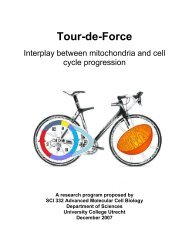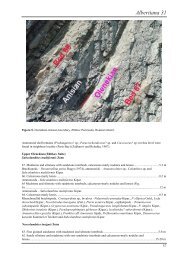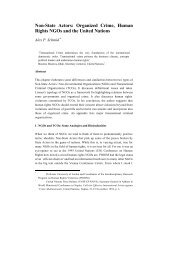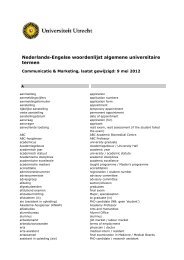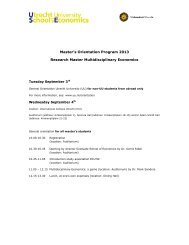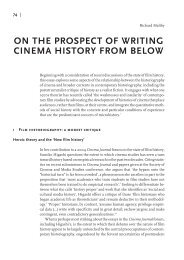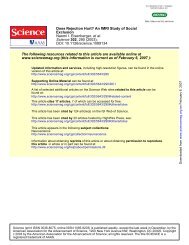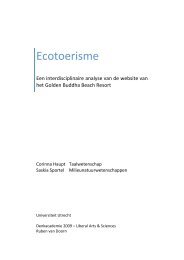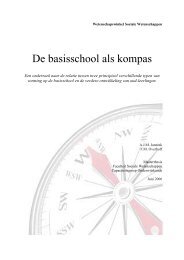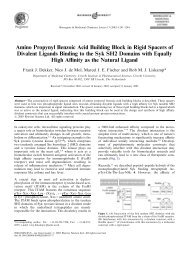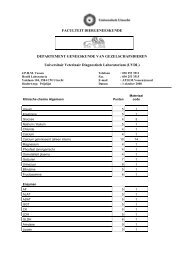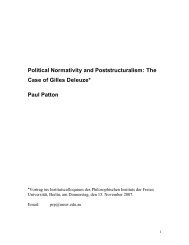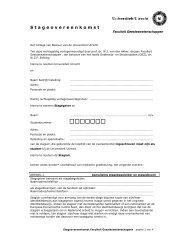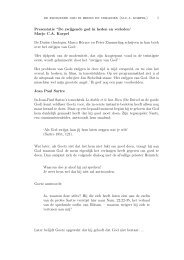Review of the Research Institute for History and - Universiteit Utrecht
Review of the Research Institute for History and - Universiteit Utrecht
Review of the Research Institute for History and - Universiteit Utrecht
You also want an ePaper? Increase the reach of your titles
YUMPU automatically turns print PDFs into web optimized ePapers that Google loves.
A. Documentation regarding <strong>the</strong> level <strong>of</strong> <strong>the</strong> research programme<br />
Title <strong>of</strong> <strong>the</strong> programme:<br />
International <strong>and</strong> Political <strong>History</strong><br />
Starting date:<br />
1994<br />
<strong>Research</strong> area <strong>and</strong> mission:<br />
International political relations, confl ict-studies, political history (after 1600)<br />
Programme leaders:<br />
Pr<strong>of</strong>. H. Righart (1994-1997), Pr<strong>of</strong>. D. Hellema (1998-)<br />
Affi liations outside <strong>the</strong> institute (e.g. research school) <strong>and</strong> o<strong>the</strong>r cooperations <strong>and</strong> relations<br />
with national <strong>and</strong> international research groups:<br />
Center <strong>of</strong> Confl ict Studies<br />
School <strong>of</strong> Human Rights <strong>Research</strong><br />
A 1. Leadership<br />
With 8,13 fte this is one <strong>of</strong> <strong>the</strong> smaller groups within OGC. It comprises 2 full<br />
pr<strong>of</strong>essors, 1 extra-ordinary pr<strong>of</strong>essor, 3 associate pr<strong>of</strong>essors, 9 assistant pr<strong>of</strong>essors,<br />
5 Postdocs, <strong>and</strong> 3 PhD-students. The programme consists <strong>of</strong> <strong>the</strong> researchers in<br />
<strong>the</strong> <strong>History</strong> Department connected to <strong>the</strong> chairs <strong>of</strong> <strong>the</strong> <strong>History</strong> <strong>of</strong> International<br />
Relations, <strong>and</strong> Political <strong>History</strong>. During <strong>the</strong> period under review both chairs have<br />
changed h<strong>and</strong>s. Since 1998 pr<strong>of</strong>. Duco Hellema is chair in <strong>the</strong> <strong>History</strong> <strong>of</strong> International<br />
Relations, whilst pr<strong>of</strong>. Ido de Haan was appointed chair in Political <strong>History</strong><br />
in 2003. His predecessor pr<strong>of</strong>. Hans Righart († 2002) has been programme leader<br />
till 1998. Since <strong>the</strong>n Hellema has been in charge. The two chairs have operated<br />
more or less independently during most <strong>of</strong> <strong>the</strong> period under review, each <strong>for</strong><br />
instance organizing <strong>the</strong>ir own research seminar meetings. The current chairs are<br />
now seriously engaged in discussions about closer cooperation. The group as a<br />
whole is very active, with a high publication <strong>and</strong> dissertation output.<br />
A 2. Strategy <strong>and</strong> policy<br />
The programme has concentrated on domestic politics within European states,<br />
particularly <strong>the</strong> Ne<strong>the</strong>rl<strong>and</strong>s, <strong>and</strong> <strong>the</strong> international relations <strong>of</strong> those European<br />
states on <strong>the</strong> o<strong>the</strong>r h<strong>and</strong>, again with an emphasis on <strong>the</strong> Ne<strong>the</strong>rl<strong>and</strong>s. <strong>Utrecht</strong> has<br />
a long-st<strong>and</strong>ing tradition in this latter fi eld. The <strong>History</strong> <strong>of</strong> International Relations<br />
was explored in four <strong>the</strong>matic areas: 1. <strong>the</strong> development <strong>of</strong> <strong>the</strong> European state<br />
system in <strong>the</strong> early modern era, 2. Dutch international relations in <strong>the</strong> 19 th <strong>and</strong><br />
20 th centuries, 3. <strong>the</strong> relations between Europe <strong>and</strong> <strong>the</strong> non-European world, <strong>and</strong><br />
4. humanitarian policies <strong>and</strong> <strong>the</strong> development <strong>of</strong> international norms <strong>and</strong> peaceful<br />
cooperation.<br />
In <strong>the</strong> past period, <strong>the</strong> programme has focused less exclusively on states as<br />
rational-political actors (as in traditional diplomatic history). More attention has<br />
been paid to <strong>the</strong> idealistic <strong>and</strong> humanitarian aspects <strong>of</strong> interstate relationships,<br />
notably <strong>the</strong> developments <strong>of</strong> human rights <strong>and</strong> its bearings on <strong>the</strong> acting <strong>of</strong> states<br />
(with a focus on Dutch human rights policy). Beside that, <strong>the</strong>re was a growing<br />
interest in sub-state relationships, notably <strong>the</strong> actions <strong>of</strong> non-governmental actors<br />
<strong>and</strong> <strong>the</strong> impact <strong>of</strong> public opinion. These shifts <strong>of</strong> emphasis constituted an innovative<br />
impulse within <strong>the</strong> discipline <strong>of</strong> International <strong>History</strong> <strong>and</strong> relate to similar developments<br />
in <strong>the</strong> study <strong>of</strong> international relations within <strong>the</strong> political sciences. <strong>Research</strong><br />
on <strong>the</strong> issue <strong>of</strong> human rights indicates, however, that <strong>the</strong> infl uence <strong>of</strong> idealistic<br />
OGC International <strong>and</strong> Political <strong>History</strong><br />
268



